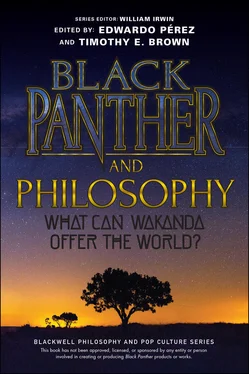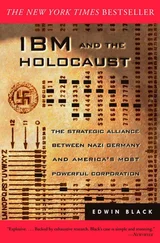Black Panther and Philosophy
Здесь есть возможность читать онлайн «Black Panther and Philosophy» — ознакомительный отрывок электронной книги совершенно бесплатно, а после прочтения отрывка купить полную версию. В некоторых случаях можно слушать аудио, скачать через торрент в формате fb2 и присутствует краткое содержание. Жанр: unrecognised, на английском языке. Описание произведения, (предисловие) а так же отзывы посетителей доступны на портале библиотеки ЛибКат.
- Название:Black Panther and Philosophy
- Автор:
- Жанр:
- Год:неизвестен
- ISBN:нет данных
- Рейтинг книги:4 / 5. Голосов: 1
-
Избранное:Добавить в избранное
- Отзывы:
-
Ваша оценка:
- 80
- 1
- 2
- 3
- 4
- 5
Black Panther and Philosophy: краткое содержание, описание и аннотация
Предлагаем к чтению аннотацию, описание, краткое содержание или предисловие (зависит от того, что написал сам автор книги «Black Panther and Philosophy»). Если вы не нашли необходимую информацию о книге — напишите в комментариях, мы постараемся отыскать её.
Black Panther and Philosophy: What Can Wakanda Offer The World
Black Panther
Black Panther and Philosophy
Black Panther and Philosophy — читать онлайн ознакомительный отрывок
Ниже представлен текст книги, разбитый по страницам. Система сохранения места последней прочитанной страницы, позволяет с удобством читать онлайн бесплатно книгу «Black Panther and Philosophy», без необходимости каждый раз заново искать на чём Вы остановились. Поставьте закладку, и сможете в любой момент перейти на страницу, на которой закончили чтение.
Интервал:
Закладка:
Matthew B. Lloydwas created in 1970 in comics published in Charlotte, NC. He would later appear with an art history MA in University of Louisville Comics. He currently appears on a podcast on the Comics in Motion Network, Classic Comics with Matthew B. Lloyd. He can also regularly be found writing reviews and editorials at www.dccomicsnews.comwhen he’s not appearing in Restaurant Manager Comics. He has previously co-authored an essay with Ian J. Drake in Politics in Gotham: The Batman Universe and Political Thought .
Edwardo Pérezwas raised by the Puma deity on an alternate Earth (where the Mayans ruled the entire planet) to be Jaguar Paw, the Mayan equivalent of Wakanda’s Black Panther. But after The Blip, Edwardo appeared on Earth-616 disguised as an unassuming (though smartly dressed) Professor of English and prolific writer, contributing essays and blogs to the Blackwell Philosophy and Pop Culture Series. Stripped of his Jaguar power, but endowed with rhetorical prowess, Edwardo instructs students in the ancient art of persuasion and the modern ways of critical theory at Tarrant County College Northeast. But, on the off chance that Doctor Strange is able to transport Edwardo back to his home world (where he could regain his Jaguar Paw powers), Edwardo keeps his claws sharpened, ready to aid anyone in the multiverse who needs help.
Charles F. Petersonis a Blerd from the hidden Black land of 1970s/80s Gary, IN. His Blerd consciousness was awakened by pages of The Uncanny X-Men , #127, vol. 1. He went on to receive degrees in philosophy from Morehouse College (BA), and philosophy, interpretation and culture from Binghamton University (MA, PhD). He writes in the areas of Africana political theory, cultural theory, and aesthetics. He is the author of DuBois, Fanon, Cabral: The Margins of Elite Anti-Colonial Leadership (2007) and the forthcoming Beyond Civil Disobedience: Social Nullification and Black Citizenship (2021). He is currently an Associate Professor of Africana studies at Oberlin College.
Kevin J. Porterhas been an avid fan of superhero comics, graphic novels, television programs, movies, and collectibles for over 40 years. After all this time, he still keeps by his bedside a fresh stack of single issues or trade paperback collections that he reads nearly every evening, sometimes staying up much later than he should even though he really ought to know better by now. After coming to the painful realization that he just wasn’t going to be the next Stan Lee or Frank Miller, Kevin pursued his true calling as an academic and is currently Associate Professor and Department Chair of English at the University of Texas at Arlington. This chapter marks his first contribution to a volume in the Blackwell Philosophy and Pop Culture Series.
Jolynna Sinananhas spent the past two decades watching movies when she should have been reading philosophy, reading philosophy when she could have been watching movies, and writing about neither. She is a researcher in media and anthropology and her fieldwork in Trinidad (which earned her a War Dog tattoo) is the subject of the books Webcam and Visualising Facebook (with Daniel Miller) and Social Media in Trinidad , where there are short sections on Breaking Bad and Paranormal Activity and an image of Iron Man in social media in Trinidad.
Ryan Solinskyis a spinal cord injury medicine physician and scientist at Spaulding Rehabilitation Hospital and an Assistant Professor at Harvard Medical School. He lives so engrossed in the small field of spinal cord injury medicine that he can watch a Marvel movie and immediately start to think about neural connections and their correlations to societal undertones. He and co-author Dr. Wendorf grew up in the same small northern Wisconsin town and played on the same hockey line together.
Benjamin D. Wendorf, PhD, is a former Zamboni driver, now Associate Professor of History at Quinsigamond Community College and a lecturer at Clark University, specializing in Africa and the African Diaspora. He has published on neo-African religions in the Americas and is working on a manuscript on African Diaspora railway labor for Ohio University Press. In a previous life, he was an author and editor of NHL statistical analyses, and co-founder of the NHL research website Hockey Graphs. If you are concerned about the double life he has been living, understand that both things can be done wearing the same outfit. Ben is the quiet one in the office he shares with Michael J. Gormley.
Mark D. Whiteis Chair of the Department of Philosophy at the College of Staten Island/CUNY, where he teaches courses in philosophy, economics, and law. He has edited or co-edited seven volumes in the Blackwell Philosophy and Pop Culture Series, including ones on Iron Man, Doctor Strange, and the Avengers; contributed chapters to many more; and authored books on Captain America, Batman, and Civil War . As of this writing, he is still waiting to hear back about his application to the Agents of Wakanda.
J. Lenore Wrightis the Director of the Academy for Teaching and Learning (ATL) and Associate Professor of Interdisciplinary Studies & Philosophy at Baylor University. Wright’s scholarly interests include theories and modes of self-representation and feminist philosophy. She is the author of two books: Athena to Barbie: Bodies, Archetypes, and Women’s Search for Self (2021) and The Philosopher’s ‘I’: Autobiography and the Search for the Self (2006). She serves as an expert reviewer for the International Journal of Feminist Approaches to Bioethics and a regular reviewer for Feminist Philosophy Quarterly . Wright is the co-editor of Called to Teach: Excellence, Commitment, and Community in Christian Higher Education (2020), and she is an academic consultant for the International Organization for Student Success, publisher of the College Portfolio for Success . Wright received Baylor’s Outstanding Professor Award in 2008/9 for distinctive teaching.
Introduction A Few Words from the Wakandan International Outreach Centre
Edwardo Pérez and Timothy E. Brown
When the character of Black Panther first appeared in Fantastic Four no. 52 in July 1966, legendary creators Stan Lee and Jack Kirby didn’t just write a story about another hero with extraordinary powers, they birthed the first Black superhero. For Lee, “it was a very normal thing,” because “A good many of our people here in America are not white. You’ve got to recognize that and you’ve got to include them in whatever you do.” 1
While it might’ve seemed normal to Lee, Black Panther’s (and Wakanda’s) significance cannot be overstated. After all, the first Black superhero isn’t just a Black superhero, he’s the King of an African nation endowed with otherworldly powers, and Wakanda isn’t just an African nation, it’s the most advanced civilization the Earth has ever seen. Indeed, it shouldn’t be lost on us that when Black Panther was introduced (during the Civil Rights era of the 1960s) the thought of a Black President – or an advanced, futuristic African society – would have been, well, unthinkable for too many people.
Perhaps Stan was being modest. Or, perhaps Stan was just being Stan, using his platform, his voice, and his characters to tackle the issues of society in a way only superheroes in comics can. Indeed, one of the most noteworthy columns Stan published, tackling social issues, was a “Stan’s Soapbox” in 1968 that began with the following statement:
Let’s lay it right on the line. Bigotry and racism are among the deadliest social ills plaguing the world today. But, unlike a team of costumed super-villains, they can’t be halted with a punch in the snoot, or a zap from a ray gun. The only way to destroy them is to expose them – to reveal them for the insidious evils they really are. 2
Читать дальшеИнтервал:
Закладка:
Похожие книги на «Black Panther and Philosophy»
Представляем Вашему вниманию похожие книги на «Black Panther and Philosophy» списком для выбора. Мы отобрали схожую по названию и смыслу литературу в надежде предоставить читателям больше вариантов отыскать новые, интересные, ещё непрочитанные произведения.
Обсуждение, отзывы о книге «Black Panther and Philosophy» и просто собственные мнения читателей. Оставьте ваши комментарии, напишите, что Вы думаете о произведении, его смысле или главных героях. Укажите что конкретно понравилось, а что нет, и почему Вы так считаете.












